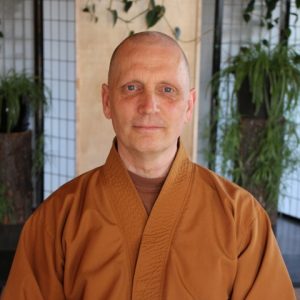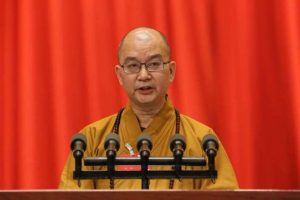Buddhism is not just a religion guiding us toward worldly kindness
Many people say, “All religions lead people toward worldly kindness, so they are basically the same.” Generally speaking, this is true. All religions advise people to “be kind and refrain from hurting others.” In addition, Buddhism also advises people to “purify the mind.” But what does this mean?
“Purity” is a fundamental principle of Buddhism and refers to attaining perfect enlightenment and achieving buddhahood by leading sentient beings to ultimate emancipation. Thus, the ultimate aim of the Buddhist teachings is to lead us to become a buddha. Only a buddha dwells in the state of “purity.”
The original intent of Shakyamuni Buddha’s appearance in the world is to “reveal the teachings of the way and save multitudes of beings by endowing them with real benefits,” as said in the Infinite Life Sutra. “Real benefits” also refer to attaining perfect enlightenment and becoming a buddha.
Why is the real benefit of the Buddhist path “becoming a buddha?” How can the Buddha enable us to dwell in the state of “purity?” To understand these things, we must recall what Shakyamuni Buddha said when he attained perfect enlightenment and became a buddha in India 2,560 years ago.
Buddhism is the truth that guides us to become buddhas
Shakyamuni Buddha said: “All sentient beings in the land possess the wisdom and virtues of the Tathagata [another name for the Buddha]; however, they do not realize it because of their false thoughts and attachments.” This statement reveals that a human being is, by nature, the same as a buddha.
In other words, a buddha is an enlightened human being, and a human being is an unenlightened buddha. “Wisdom and virtues of the Tathagata” refers to the purity of a buddha, and “false thoughts and attachment” refer to the defilements of a human being.
Shakyamuni Buddha appeared in the world and taught us the way to become buddhas, hoping that we would “return” to our original nature (the state of purity) by converting our false thoughts to wisdom and our attachments to virtues (such as kindness).
As we have seen, all sentient beings have the same original nature, known as buddha-nature, which exists in a state of purity. If our mind is pure, our body and the land around us are also pure. Similarly, if the body is pure, the mind and land are pure. If the land is pure (known as “pure land”), the mind and body are also pure.
Body and land are manifestations of mind. The three aspects of mind, body, and land are interdependent, like left, right, and center. Without an arbitrary line defined as the center, left, and right are actually non-existent on their own. If our mind is in a state of emptiness, body, and land are also indeterminate.
Dependent origination is a unique and fundamental dogma in Buddhism
All the points above are derived from the Law of Dependent Origination, which is a unique and fundamental dogma in Buddhism. It is totally different from all other “creator-based” or monotheistic religions. In order to correctly interpret the Buddhist teaching, one has to know and understand the Law of Dependent Origination.
The Law of Dependent Origination is defined in the Buddhist sutras in the following way: it is produced because that is produced; it is extinguished because that is extinguished. It appears because that appears; it disappears because that disappears. This means that all phenomena are interrelated and interdependent on one another.
In this respect, a buddha and a human being are mutually and existentially dependent on the other. If there is no human being, there is no buddha, and vice versa. Buddhas exist because sentient beings exist. Like “left” and “right,” they must coexist. Without the arbitrary reference point defined as the center, there is no left and right in reality.
In Buddhism, it is said: “Mind, Buddha, and sentient beings are three without any difference.” Again, this is like center, left, and right. It means that buddhas and sentient beings are manifestations of the mind. If the mind is “purified,” or “disappears,” or exists in a state of purity and emptiness, where are buddhas and sentient beings?
The Buddhas’ mind embraces sentient beings with unconditional kindness
A buddha is perfectly empathetic and always puts himself in the shoes of sentient beings and can therefore fully understand their sufferings. Shakyamuni Buddha says in the Contemplation Sutra, “The Buddhas’ Mind is Great Kindness and Compassion. It embraces all sentient beings with unconditional kindness.”
Unconditional kindness is the greatest kindness of all. Instead of requiring sentient beings to purify their minds and bodies to become a buddha, the buddhas enable sentient beings to be reborn in their buddha-lands, where their minds and bodies will be naturally purified and become buddha-like in their splendor and virtue.
This is actually the “real benefit bestowed upon sentient beings,” as stated by Shakyamuni Buddha in the “original intent” section of the Infinite Life Sutra (see above). How can a buddha bestow this real benefit upon us? Shakyamuni Buddha explains in the Contemplation Sutra:
The Buddha Amitayus possesses eighty-four thousand physical characteristics, each having eighty-four thousand secondary marks of excellence. Each secondary mark emits eighty-four thousand rays of light; each light shining universally upon the lands of the ten directions, embracing, and not forsaking, those who think of the Buddha.
It is through the name of Amitabha Buddha, which manifests in the form of light, that sentient beings receive the true and real benefit. Amitabha’s light permeates all the worlds in the 10 directions, and his Name contains the merits and virtues that enables all Amitabha-reciters to be reborn in the Land of Bliss. This is the essence of the Pure Land teaching: Amitabha’s wishes to enable all sentient beings to attain rebirth through his Name in the form of light.
Related features from BDG
The Deep and Broad Meaning of Rebirth in the Pure Land
How Many Kinds of Living Beings Are There in the Land of Bliss?
Three Milestones on the Easy Path to Becoming a Buddha












